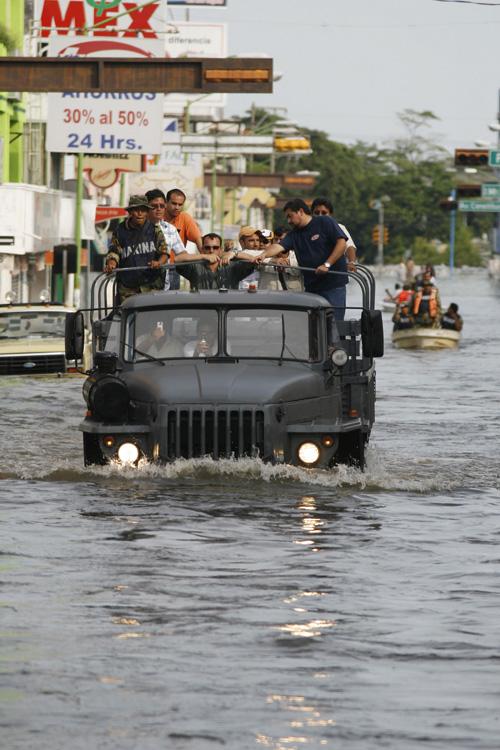Victims of Mexican flood search for food, medicine
Residents are transported on a Navy truck through a flooded street in Villahermosa, eastern Mexico, Monday. At least 20,000 people were still trapped Monday on the rooftops of homes swallowed by water. Erica Magda
November 6, 2007
VILLAHERMOSA, Mexico – Hungry and dehydrated victims of one of the worst floods in Mexico’s history scrambled for government packages of food and medicine, while at least 20,000 people remained trapped Monday on the rooftops of homes swallowed by water.
Residents were running dangerously short of food and water after nearly a week of floods left 80 percent of the Gulf Coast state of Tabasco under water and destroyed or damaged the homes of about half a million people. Gov. Andres Granier ordered central streets in the state capital of Villahermosa closed to all but rescue workers to prevent looting.
Authorities said two more bodies were found Sunday in the brackish waters covering much of the region. If the deaths are confirmed to have been caused by the flooding, the disaster’s death toll would stand at 10.
The destruction spread to neighboring Chiapas state, where helicopters flew emergency personnel to a town that was partially buried from a landslide. Officials said there were deaths, but they did not know how many yet because they were still waiting for rescuers to report.
President Bush expressed his sympathy Monday to Mexican President Felipe Calderon over the suffering caused by the flooding. Gordon Johndroe, a spokesman for the National Security Council, said Bush told Calderon the United States was ready to help the Mexican people meet their immediate needs and rebuild their lives and communities.
Get The Daily Illini in your inbox!
U.S. Ambassador Tony Garza said the U.S. had pledged $300,000 in emergency assistance to Tabasco and Chiapas.
“Americans know only too well the horrible impact of such natural disasters on the lives of individuals and communities, and we are anxious to join the international community in providing assistance to our neighbors,” he said.
After Hurricane Katrina struck the U.S. in 2005, Mexico sent a convoy of about 200 unarmed soldiers and medical personnel across the border to aid in the recovery with portable kitchens and water treatment equipment.
Mexican government officials worked furiously to distribute aid, and authorities continued trolling the water-filled streets looking for stranded residents.
Villahermosa, the state capital, was still completely under water, though river levels had begun to drop after rising to historic levels. The National Water Commission said it had begun efforts to start pumping the streets.
Desperation grew among residents who could not get their hands on government-supplied food and water or who found themselves cut off from crucial medical supplies. Garbage piled up in the murky waters days after the city suspended most public services including trash collection.
As helicopters carrying aid made stops in hard-hit areas, disputes broke out among victims who pushed through crowds and struggled frantically for the packages.
“People are fighting over food and water, and the lack of electricity and running water are making life in the city impossible,” said Martha Lilia Lopez, who has been handing out food to victims on behalf of a nonprofit foundation she heads.
Daniel Montiel Ortiz, who oversaw helicopter rescue efforts for the federal police, said rescuers were now focused on “selective evacuations” – primarily of sick people – and delivering badly needed supplies to isolated communities still surrounded by water.
Some people broke into shuttered stores and took food and household goods, and police reported detaining about 50 people for looting over the last couple of days. But Ortiz called those “isolated incidents.”
Soldiers created makeshift docks out of sandbags for boats that trolled the water-filled streets, rescuing stranded victims. Some people hitched boat rides back to homes they abandoned a week earlier to retrieve medication, clothing and other supplies before returning to shelters.







